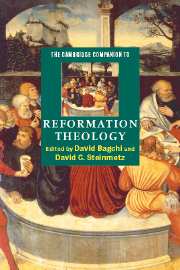Book contents
- Frontmatter
- Introduction
- 1 Late medieval theology
- 2 Lollardy
- 3 Hussite theology and the law of God
- 4 The theology of Erasmus
- 5 Luther
- 6 Melanchthon
- 7 Confessional Lutheran theology
- 8 The theology of Zwingli
- 9 Bucer
- 10 The theology of John Calvin
- 11 John Calvin and later Calvinism
- 12 The theology of Thomas Cranmer
- 13 The theology of the English reformers
- 14 The Scottish Reformation
- 15 An introduction to Anabaptist theology
- 16 Catholic theologians of the Reformation period before Trent
- 17 The Council of Trent
- Conclusion
- Select bibliography
- Index
- Series list
12 - The theology of Thomas Cranmer
Published online by Cambridge University Press: 28 May 2006
- Frontmatter
- Introduction
- 1 Late medieval theology
- 2 Lollardy
- 3 Hussite theology and the law of God
- 4 The theology of Erasmus
- 5 Luther
- 6 Melanchthon
- 7 Confessional Lutheran theology
- 8 The theology of Zwingli
- 9 Bucer
- 10 The theology of John Calvin
- 11 John Calvin and later Calvinism
- 12 The theology of Thomas Cranmer
- 13 The theology of the English reformers
- 14 The Scottish Reformation
- 15 An introduction to Anabaptist theology
- 16 Catholic theologians of the Reformation period before Trent
- 17 The Council of Trent
- Conclusion
- Select bibliography
- Index
- Series list
Summary
If historians have generally regarded Thomas Cranmer as the most complex character among the churchmen of the sixteenth-century Reformation in England, his theological legacy, particularly when finely tuned, is none too difficult to determine. For, somewhat akin to Beethoven’s masterly Eroica symphony, there is a heroic quality about the life and work of the diligent scholar Henry VIII chose to be archbishop of Canterbury. Modern scholarship may spurn such a judgement, no doubt deeming it 'old hat', simpliste, even partisan and divisive. Nevertheless, there remains an extraordinary dimension to the martyred Tudor primate.
It is tempting to take the parallel further and embrace all four movements of the Eroica. Just as Beethoven opened up a new symphonic scene, Cranmer’s involvement with Henry and Cromwell in their spirited break with Rome over the king’s ‘divorce’ surely provided a dramatic start (allegro con brio) to a Cambridge don’s career at the Tudor court. With the mass as the focal point and purpose of priestly ministry, any second stage of development in the direction of church reform also demanded slow, even dignified (larghetto!) consideration, particularly when the royal creed continued to cleave to Catholicism (papal recognition only excepted). And although it would be inappropriate to liken work on the Book of Common Prayer that followed to the light, playful passage of the scherzo, the Protestant convictions of a young and eager Edward VI at least gave Cranmer new freedom to experiment. As for the finale, what could be more frustrating than the quickening pace (allegro molto) of court faction, of the accession of Mary the Catholic, Roman renewal, and Protestant pastoral vision unfulfilled?
- Type
- Chapter
- Information
- The Cambridge Companion to Reformation Theology , pp. 150 - 160Publisher: Cambridge University PressPrint publication year: 2004



